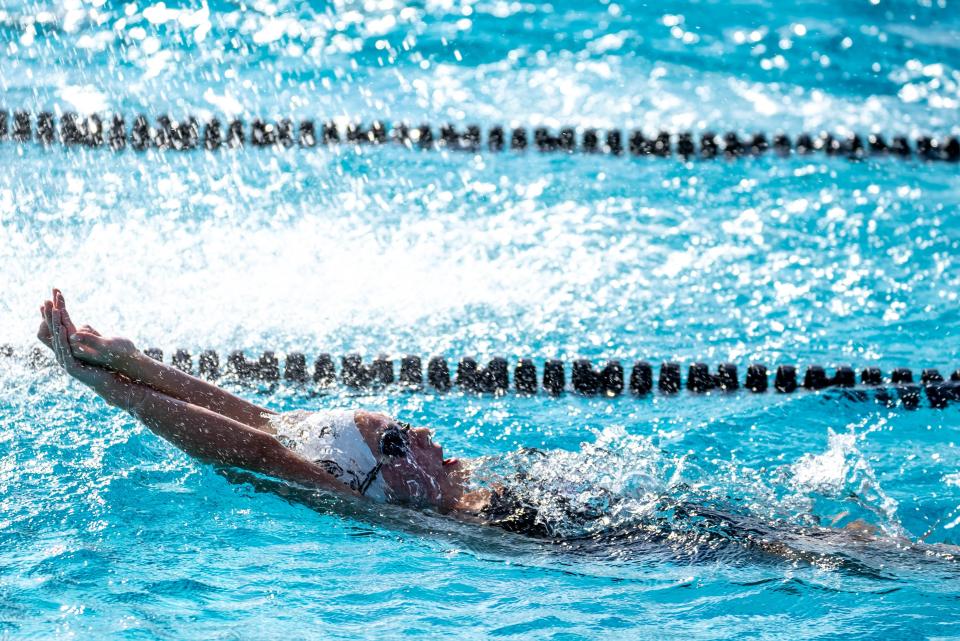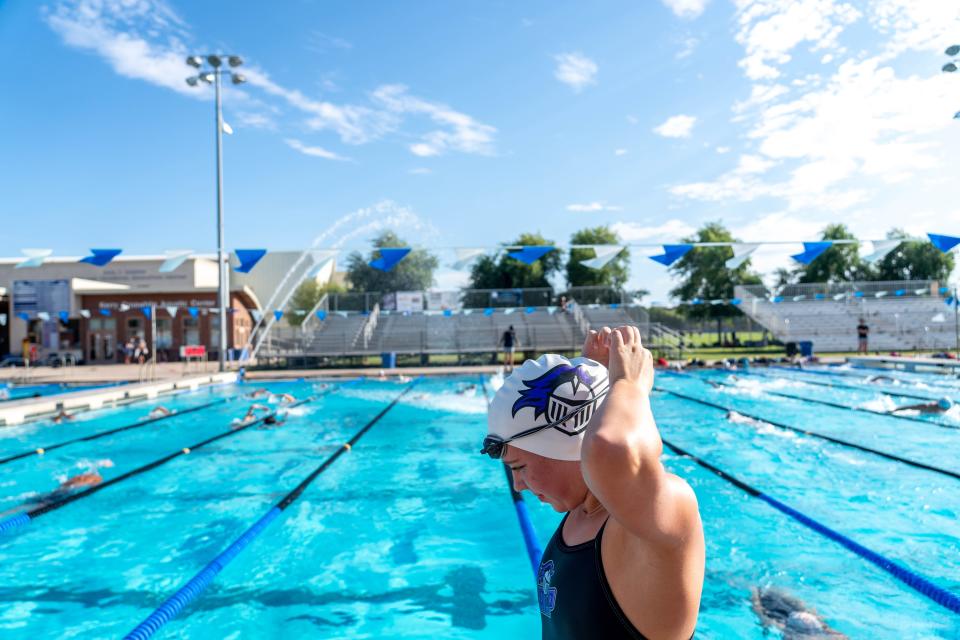One day her legs stopped working, but now she is setting swimming records
Ashlyn Tierney's first high school swimming season couldn't be going better.
She quickly broke a Chandler Arizona College Prep record in the 100-yard backstroke. She is aiming for a record in another event.
She gives the school hope that it can win its first Division III state swimming and diving championship in November.
It's hard to believe that two years ago, at age 12, Ashlyn's legs stopped working. In an instant, out of nowhere, she completely lost feeling in her legs.
"I was sitting in class and I wasn't feeling good," Ashlyn said. "So I went to the nurse's office and lied down. And it happened."

Tierney saw a neurologist, psychiatrists, counselors, and physical therapists to diagnose the cause. After tests and scans, the diagnosis was conversion disorder, her mother, Lindsey, said.
There was nothing physically wrong, Lindsey said. No nerve damage. It wasn't paralysis. She said it's the body's physical manifestation of stress and anxiety, the brain becoming overwhelmed with a "fight/flight/freeze response."
For the first few weeks, she used a wheelchair, but she was using her legs, albeit extremely slowly in the first days after they stopped working, her mom said. She used a walker. She had help from others to walk. Then, she was walking on her own. But, as her mom described, it was "like a zombie walk."
The family was scared, at a loss.
"It was more not knowing when that period of time was going to end," Ashlyn said. "It was just a waiting game."
Three months later, the numbness went away, and she had full use of her legs again.
"It was the weirdest thing," Ashlyn said. "I was at practice and my friend was being annoying. 'Can you feel it now? Can you feel it now?' I was like, 'Oh, yeah, I can.'"

Full feeling and use of her legs returned as fast as when they stopped working.
But that's not all.
She also deals with fainting episodes, something she has had since she was 3.
It is called vasovagal syncope, which is more common than conversion disorder. There are triggers that brings it on, such as the sight of blood. Ashlyn can become lightheaded to the point of momentarily passing out when she knocks into something.
When she starts to regain consciousness, her mom said, her body movements can resemble a seizure, but it's not brain related. Lindsey said it is due to having a sensitive nervous system.
It's all baffling to Ashlyn, who said she's never felt anxious. Especially, with the conversion disorder.
Lindsey heavily researched it, and discovered it can happen to teens who are high achievers and put a lot of pressure on themselves.
"She was an elite athlete at the time," Lindsey said. "She had a lot of pressure in her life. But her body wasn't recognizing that she was stressed out. It was like her body was telling her, 'If you're not going to recognize it, I'm going to recognize it.' "
Ashlyn said she was told that anxiety piled up to the point where she physically couldn't feel her legs.
"I'd be in the hospital and the doctors were like, 'Were you stressed out?' " Ashlyn said. "I'm like, 'No, I was living my life.'
"It was hard for me to recognize. So if I ever did feel anxious, it was crazy levels."
More swimming: With Brophy no longer invincible in the pool, Chaparral, Desert Vista seize spotlight
Ashlyn still passes out, sometimes at the smallest things, like bumping her elbow. Lindsey attributes it to her daughter's hyper-active nervous system. She's worked with therapists to manage her anxiety.
When she's in the pool, she's not worried about that happening. It hasn't happened.
Ashyln knows that when she does have that trigger to lay down so she doesn't hit her head. She snaps out of it quickly.
"I get a sensation and I go, 'OK, I need to take a minute,'" Ashlyn said.
She's an energetic, happy-go-luck kid whom her coaches and teammates at Arizona College Prep has embraced.
Right away, she let her coach, Kristine Nelson, knows what she has dealt with in her life.
"She exudes positivity, it's just amazing," Nelson said. "Rarely do you get a freshman who just comes in and ingratiates herself with the team.
"The way she alerted us, she's a professional about it."
When she's in the water, swimming laps at practice, Ashlyn said she's thinking about "what am going to have for dinner?" not whether something is going to trigger a fainting episode. She's not worried about being first in the pool. Most important to her is having fun.
"At first I was in denial, because it was so hard for me to feel anxiety in the first place," Ashlyn said. "I'm like, 'I'm not anxious. I'm fine.' But it was being able to recognize more signs and then just becoming more comfortable with my feelings and understanding what they mean and where they come from. It made more sense to me that helped me cope.
"I'm very a structured, analytical person. The knowing against the unknowing was the hardest part. It's just finding a structure on how to deal with it."
To suggest human-interest story ideas and other news, reach Obert at richard.obert@arizonarepublic.com or 602-316-8827. Follow him on Twitter @azc_obert.
Support local journalism: Subscribe to azcentral.com today.
This article originally appeared on Arizona Republic: From her legs not working to setting a record, ACP swimmer perseveres

